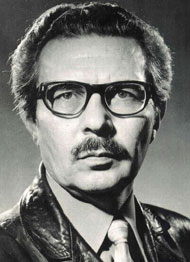This is an old revision of this page, as edited by LouisAragon (talk | contribs) at 01:06, 4 March 2018 (Reverted edits by RocketKnightX (talk) to last version by Sitush). The present address (URL) is a permanent link to this revision, which may differ significantly from the current revision.
Revision as of 01:06, 4 March 2018 by LouisAragon (talk | contribs) (Reverted edits by RocketKnightX (talk) to last version by Sitush)(diff) ← Previous revision | Latest revision (diff) | Newer revision → (diff)| This Iranian Azeris contains unreferenced categories. Please help improve this article by adding citations to reliable sources. Unsourced categories may be challenged and removed. (Learn how and when to remove this message) |
| Samin Baghtcheban | |
|---|---|
 | |
| Born | 1925 Tabriz, Iran |
| Died | 19 March 2008 Istanbul, Turkey |
| Occupation(s) | Composer, musician, author |
| Spouse | Evelyn Baghtcheban |
Samin Baghtcheban (Template:Lang-fa, Template:Lang-tr) (variations: Baghcheban, Baqcheban, Bahceban) (1925 – 19 March 2008) was an Iranian musician, composer, author and translator.
Biography
Samin Baghtcheban was born in 1925 in Tabriz to an Azeri family, and grew up in Shiraz and Tehran, where his father established the first modern kindergartens and schools for the deaf in Iran. His father, Jabbar Baghtcheban, was a leading Iranian educator and pioneer of Persian cued speech.
In 1944 Samin Baghtcheban was awarded a scholarship to study music composition in Ankara State Conservatory. He returned to Iran in 1949 and started teaching in Music Conservatory of Tehran.
He was married to the opera singer, Evelyn Baghtcheban, whom he met while studying in Ankara.
In 1984 he moved to Turkey with his family where he continued his activities and composed several new pieces, some of which were performed by Manouchehr Sahbai in Switzerland.
He died on 19 March 2008 in Istanbul.
Music career
Throughout his career he composed numerous pieces based on Iranian folklore or mythology. His most popular work is Rangin Kamoon (Rainbow), a collection of symphonic and choral tunes for children.
Literary works
Between 1948 and 1979, in addition to his composition activities, he wrote and translated several books and articles. Baghtcheban translated several books by Turkish authors Nazim Hikmet, Yaşar Kemal and introduced the humorist Aziz Nesin to Iranians.
In 1963, along with a group of prominent teachers and educators, including Lily Ahi, Touran Mirhadi and Abbas Yamini Sharif, Baghtcheban confounded the Children's Book Council (CBC) of Iran. The council is an NGO focused on developing and promoting children's literature in Iran.
References
- ^ Samin Baghtchehban. Snapshots from My Father (چهره هایی از پدرم) (in Persian). ISBN 964-341-209-1.
- "Opera singer Evelyn Baghcheban dies in Istanbul". Tehran Times. Retrieved 2010-11-02.
- ثمین باغچه بان درگذشت (in Persian). BBC Persian. Retrieved 2010-11-02.
- "Norouz is not coming!" (in Persian). Harmonytalk music magazine. Retrieved 2010-11-02.
- "Children VII. Children's Literature". http://www.iranicaonline.org. 17 October 2011. p. Vol. V, Fasc. 4, pp. 417–423. Retrieved 22 August 2015.
{{cite web}}: External link in|website=
External links
- Template:Fa icon My brother Samin (برادرم ثمین), a multimedia presentation on Baghtchehban's life, Jadid online
- Samin Baghtcheban dead ثمین باغچه بان درگذشت, BBC Persian
- Rangin Kamoon was our childhood...In memory of Samin Baghtcheban رنگین کمان کودکی ما بود...؛ به یاد ثمین باغچه بان, Obituary in BBC Persian
- Template:Fa icon Book review of Baghtcheban's Snapshots from My Father نقدي بر کتاب چهره هايي از پدرم
- Template:Fa icon Norouz is coming... نوروز تو راهه..., Article on Rangin Kamoon album
- Rangin Kamoon (رنگین کمان), A small tribute to Rangin Kamoon Album
This article on an Iranian musician is a stub. You can help Misplaced Pages by expanding it. |
- Azerbaijani-language writers
- 1925 births
- 2008 deaths
- Iranian composers
- Iranian musicians
- Iranian Azerbaijani musicians
- Iranian translators
- Iranian writers
- People from Tabriz
- Iranian emigrants to Turkey
- Turkish people of Iranian descent
- Ankara State Conservatory alumni
- 20th-century translators
- Iranian musician stubs